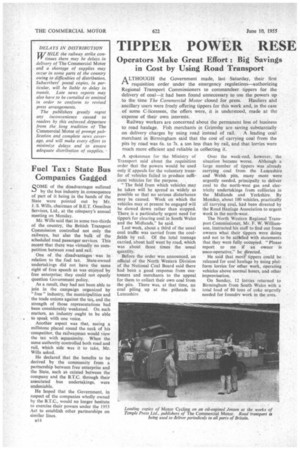TIPPER POWER RESE
Page 48

If you've noticed an error in this article please click here to report it so we can fix it.
Operators Make Great Effort: Big Savings in Cost by Using Road Transport
LTHOUGH the Government made, last Saturday, their first requisition order under the emergency regulations—authorizing Regional Transport Commissioners to commandeer tippers for the delivery of coal—it had been found unnecessary to use the powers up to the time The Commercial Motor closed for press. Hauliers and ancillary users were freely offering tippers for this work and, in the case of some C-licensees, the offers were, it is understood, made at the expense of their own interests.
Railway workers are concerned about the permanent loss of business to road haulage. Fish merchants in Grimsby are saving substantially on delivery charges by using road instead of rail. A leading coal merchant in 'Birmingham said that the cost of carrying coal from the pits by road was 6s. to 7s. a ton less than by rail, and that lorries were much more efficient and reliable in collecting it.
A spokesman for the Ministry of Transport said about the requisition order that the powers would be used only if appeals for the voluntary transfer of vehicles failed to produce sufficient vehicles for the purpose.
"The field from which vehicles may be taken will be spread as widely as possible so that no serious disturbance may be caused. Work on which the vehicles may at present be engaged will be slowed down rather than stopped. There is a particularly urgent need for tippers for clearing coal in South Wales and the Midlands," be said.
Last week, about a third of the usual coal traffic was carried from the coalfields by rail. Of the total tonnage carried, about half went by road, which was about three times the usual quantity.
Before the order was announced, an official of the North Western Division of the National Coal Board said there had been a good response from customers and merchants to the appeal for them to collect their own coal from the pits. There was, at that time, no coal piling up at the pitheads in Lancashire
Over the week-end, however, the situation became worse. Although a large number of tippers was already carrying coal from the Lancashire and Welsh pits, many more were urgently needed, principally to deliver coal to the north-west gas and electricity undertakings from collieries in the Midlands and Yorkshire. By Monday, about 100 vehicles, practically all carrying coal, had been directed by the Road Haulage Association to urgent work in the north-west.
The North Western Regional Transport Commissioner, Mr. F. W. Williamson, instructed his staff to find out from owners what their tippers were doing and not to be satitfied with statements that they were fully occupied. "Please report to me if an owner is unco-operative," he directed.
He said that more tippers could be released for coal haulage by using platform lorries for other work, operating vehicles above normal hours, and other improvisation.
On Sunday, 12 lorries returned to Birmingham from South Wales with a total load of 80 tons of coke urgently needed for foundry work in the area.




























































































































































